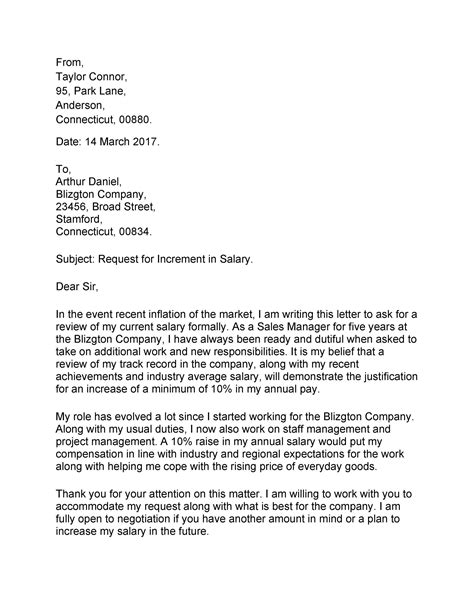Requesting A Raise Via Email: Best Practices Revealed

Asking for a raise can be a daunting task, but it is an important step in advocating for your worth and career growth. While it may be easier to ask for a raise in person, sending an email can be a more effective way to clearly articulate your reasons and provide evidence to support your request. In this article, we will reveal the best practices for requesting a raise via email, so that you can confidently communicate your value to your employer.
1. Determine Your Worth
Before asking for a raise, it is important to know your worth in the market. Research the average salary for your position in your industry and location. Websites such as Glassdoor, PayScale, and LinkedIn Salary can provide helpful insights. Additionally, consider your skills, experience, and contributions to the company. Be prepared to provide evidence of your accomplishments and how they have helped the company.
2. Choose the Right Time to Ask
Timing is everything when it comes to asking for a raise. Avoid asking during times of stress for the company, such as during a major project or budget cuts. Instead, choose a time when your employer is likely to be receptive, such as after a successful project or during a performance review. Additionally, consider the company’s fiscal calendar and budget cycles when making your request.
3. Craft a Professional Email
Your email should be professional and concise. Address your boss or supervisor by name and use a formal tone. Begin with a polite greeting and a statement of appreciation for the opportunity to work for the company. Then, clearly state your request for a raise and your reasons for the request. Provide evidence of your achievements and contributions to the company. End the email with a polite conclusion and a willingness to discuss the matter further in person.
4. Be Prepared for a Counteroffer
Be prepared for the possibility of a counteroffer. Your employer may not be able to meet your requested salary increase, but may be able to offer other incentives such as additional benefits or flexible work arrangements. Consider these options and be open to negotiation.
5. Follow Up
If you do not receive a response to your email within a reasonable amount of time, follow up with a polite reminder. This shows your employer that you are serious about your request and willing to pursue it further.
6. Conclusion
Asking for a raise can be an intimidating process, but it is an important step in advocating for your worth and career growth. By following these best practices for requesting a raise via email, you can confidently communicate your value to your employer and increase your chances of success.
FAQs about Requesting a Raise via Email
Q: Should I ask for a raise via email or in person?
A: While asking for a raise in person may seem more personal, sending an email can be more effective in clearly articulating your reasons and providing evidence to support your request. Additionally, it provides a written record of your request and your employer’s response.
Q: How often should I ask for a raise?
A: It is generally recommended to wait at least a year before asking for a raise. However, if you have taken on additional responsibilities or achieved significant accomplishments, it may be appropriate to ask for a raise sooner.
Q: What if my employer denies my request for a raise?
A: If your employer denies your request for a raise, ask for feedback on what you can do to improve your chances in the future. Additionally, consider other options such as negotiating for other incentives or seeking opportunities for career growth within the company.
Q: Can I negotiate my salary via email?
A: Yes, negotiating your salary via email can be an effective way to communicate your requests and provide evidence to support your value. However, be prepared to follow up with an in-person conversation if necessary.
Q: What if I am not comfortable asking for a raise?
A: Asking for a raise can be intimidating, but it is an important step in advocating for your worth and career growth. Consider practicing with a friend or mentor before making your request. Additionally, remember that you have the right to advocate for your value and that the worst that can happen is that your employer says no.
